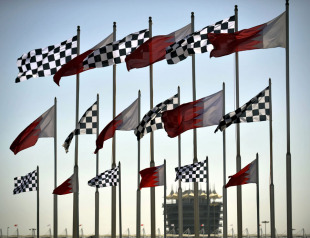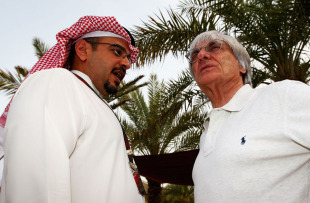
- In Focus:
- Bahrain Grand Prix Controversy
- News:
-
Damon Hill leads opposition to Bahrain rescheduling
- News:
-
Bahrain unrest continues on eve of FIA meeting
- News:
-
India happy to change date to accommodate Bahrain
- News:
-
Bahrain circuit insists it could 'hold the race today'
- News:
-
December calendar extension 'too much' - Brawn
- News:
-
Season could end December 11 to accommodate Bahrain
On Friday, the FIA meets in Barcelona, and high on the agenda will be the issue of whether the 2011 Bahrain Grand Prix should be rescheduled for the tail end of the year.
After weeks of well-orchestrated campaigning and oleaginous schmoozing by high-powered officials from the ruling party and the circuit, what two months ago seemed unlikely is now an alarming possibility.
The authorities need to rebuild the tarnished image of Bahrain, and with that in mind the authorities, aided by a number of others with vested interests, have incessantly insisted life is back to a near normal.
The best vehicle for showing all is well is for the grand prix to go ahead. Only the most naive observer could think there is any other reason for the campaign to get it back on the calendar. The decision to end martial law - but not for the withdrawal of the Saudi forces - two days before the FIA meeting is hardly coincidental.
The three-prong approach of the Bahrain authorities has been simple. Firstly, deny everything. Secondly, work on the basis that if you repeat a lie often enough, people will start to believe it. Thirdly, discredit anyone who says differently.
Human rights organisations and major governments who report otherwise are dismissed as being misguided. But only a fortnight ago, Barack Obama, one of the kingdom's staunchest allies, said of Bahrain: "The only way forward is for the government and opposition to engage in a dialogue, and you can't have a real dialogue when parts of the peaceful opposition are in jail."
International respected foreign media, who continue to report all is far from normal, are dismissed as being biased. There is no independent free media inside the kingdom, and now overseas journalists are being targeted as well.
Matthew Syed, The Times
A lead editorial eight days ago in the Times - another organisation accused of having agendas - highlighted the active campaign being waged by Bahrain to get the grand prix reinstated. It concluded: "It must not succeed. The roar of petrol engines around the tiny kingdom, smothered with advertising, would be too great a symbol that Western acquiescence to repression can be bought with stability and an oil industry."
Barely a day goes by without a report from Bahrain of more human rights abuse, of the torture of civilians, of the continuing repression of any dissent. This is not about detaining people accused of inciting rebellion. This is simply about crushing opposition to the dictatorship. Twenty-three doctors and 24 nurses have been arrested for no offence other than treating protestors.
Of course, the easiest people for the Bahrain royal family to persuade are those running motorsport. Bernie Ecclestone and others have always gone where the money is, and given the involvement of the Bahrainis with teams such as McLaren, which is part owned by the Bahrain state investment group Mumtalakat Holding, allied to the massive amounts of money they have and continue to throw at the sport, it was amazing the original March race was called off in the first place.
There have also been those who claim holding the race will allow Formula One to be a force for change. Rarely in history has that shown to work, from the 1936 Berlin Olympics to rugby and cricket tour of apartheid South Africa.
Officially, teams and drivers remain apolitical. But behind the scenes there is unease, not with the prospect of visiting Bahrain so much as extending an already bloated season. A few senior officials have spoken of their unhappiness with a December conclusion, and it could be this that finally goes for the race this year.
There is no reason the Bahrain Grand Prix should not be included on the 2012 calendar, with an option to review the situation nearer the end of this year. By then, it ought to be clear if claims of normality are accurate or just what the regime wants outsiders to believe.

There is one other possibility, namely that Bernie has once again been crafty. By scheduling a mid-December finish to the season and switching the dates of the Indian Grand Prix, he could have proposed something he knew would not work.
The logistics of broadcasters and teams to alter long-arranged plans, not to mention issues with getting the Formula One circus insurance for Bahrain, can be cited as reasons the race cannot be rescheduled.
Ecclestone can also say there was too much unrest within teams at the extended season, gaining some points from them for listening to their objections.
In so doing, he also keeps his friends in Bahrain sweet. And the Bahrain authorities can tell everyone who will listen that the race would have gone ahead but for the complexities of the Formula One calendar. The truth, after all, is not something they are overly bothered about.
Martin Williamson is managing editor of digital media ESPN EMEA
© ESPN Sports Media Ltd.
 Martin Williamson is managing editor of digital media ESPN EMEA Martin Williamson, who grew up in the era of James Hunt, Niki Lauda and sideburns, became managing editor of ESPN EMEA Digital Group in 2007 after spells with Sky Sports, Sportal and Cricinfo
Martin Williamson is managing editor of digital media ESPN EMEA Martin Williamson, who grew up in the era of James Hunt, Niki Lauda and sideburns, became managing editor of ESPN EMEA Digital Group in 2007 after spells with Sky Sports, Sportal and Cricinfo

